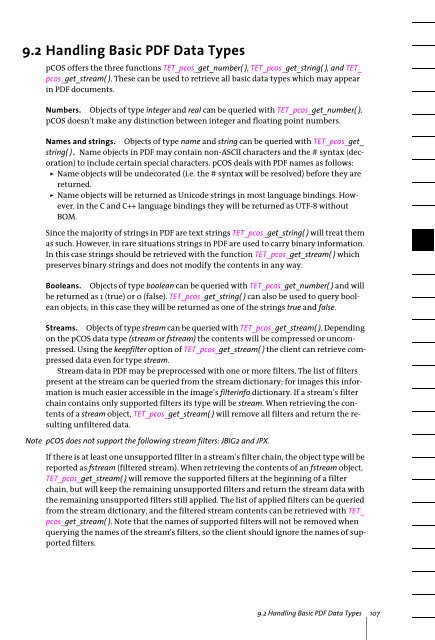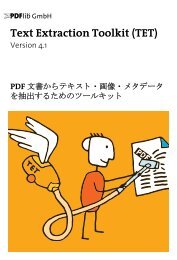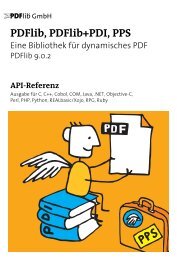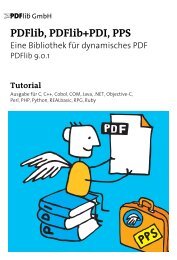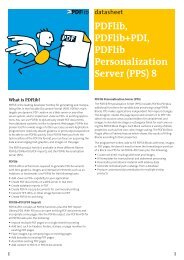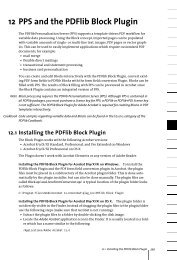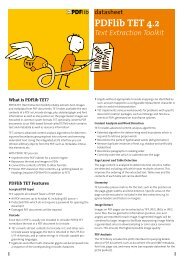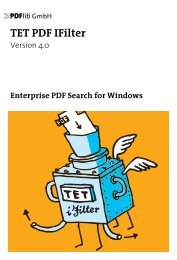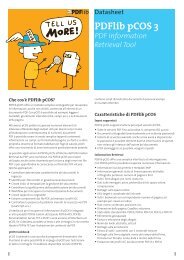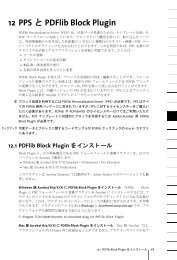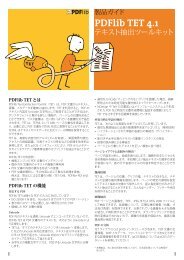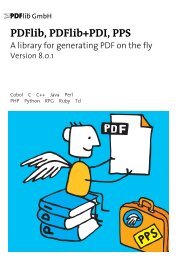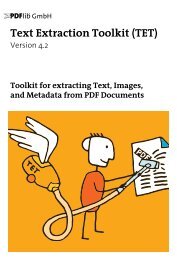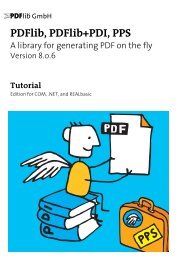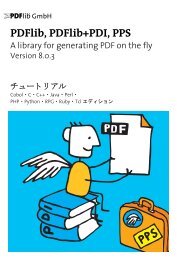PDFlib Text Extraction Toolkit (TET) Manual
PDFlib Text Extraction Toolkit (TET) Manual
PDFlib Text Extraction Toolkit (TET) Manual
You also want an ePaper? Increase the reach of your titles
YUMPU automatically turns print PDFs into web optimized ePapers that Google loves.
9.2 Handling Basic PDF Data Types<br />
pCOS offers the three functions <strong>TET</strong>_pcos_get_number( ), <strong>TET</strong>_pcos_get_string( ), and <strong>TET</strong>_<br />
pcos_get_stream( ). These can be used to retrieve all basic data types which may appear<br />
in PDF documents.<br />
Numbers. Objects of type integer and real can be queried with <strong>TET</strong>_pcos_get_number( ).<br />
pCOS doesn’t make any distinction between integer and floating point numbers.<br />
Names and strings. Objects of type name and string can be queried with <strong>TET</strong>_pcos_get_<br />
string( ). Name objects in PDF may contain non-ASCII characters and the # syntax (decoration)<br />
to include certain special characters. pCOS deals with PDF names as follows:<br />
> Name objects will be undecorated (i.e. the # syntax will be resolved) before they are<br />
returned.<br />
> Name objects will be returned as Unicode strings in most language bindings. However,<br />
in the C and C++ language bindings they will be returned as UTF-8 without<br />
BOM.<br />
Since the majority of strings in PDF are text strings <strong>TET</strong>_pcos_get_string( ) will treat them<br />
as such. However, in rare situations strings in PDF are used to carry binary information.<br />
In this case strings should be retrieved with the function <strong>TET</strong>_pcos_get_stream( ) which<br />
preserves binary strings and does not modify the contents in any way.<br />
Booleans. Objects of type boolean can be queried with <strong>TET</strong>_pcos_get_number( ) and will<br />
be returned as 1 (true) or 0 (false). <strong>TET</strong>_pcos_get_string( ) can also be used to query boolean<br />
objects; in this case they will be returned as one of the strings true and false.<br />
Streams. Objects of type stream can be queried with <strong>TET</strong>_pcos_get_stream( ). Depending<br />
on the pCOS data type (stream or fstream) the contents will be compressed or uncompressed.<br />
Using the keepfilter option of <strong>TET</strong>_pcos_get_stream( ) the client can retrieve compressed<br />
data even for type stream.<br />
Stream data in PDF may be preprocessed with one or more filters. The list of filters<br />
present at the stream can be queried from the stream dictionary; for images this information<br />
is much easier accessible in the image’s filterinfo dictionary. If a stream’s filter<br />
chain contains only supported filters its type will be stream. When retrieving the contents<br />
of a stream object, <strong>TET</strong>_pcos_get_stream( ) will remove all filters and return the resulting<br />
unfiltered data.<br />
Note pCOS does not support the following stream filters: JBIG2 and JPX.<br />
If there is at least one unsupported filter in a stream’s filter chain, the object type will be<br />
reported as fstream (filtered stream). When retrieving the contents of an fstream object,<br />
<strong>TET</strong>_pcos_get_stream( ) will remove the supported filters at the beginning of a filter<br />
chain, but will keep the remaining unsupported filters and return the stream data with<br />
the remaining unsupported filters still applied. The list of applied filters can be queried<br />
from the stream dictionary, and the filtered stream contents can be retrieved with <strong>TET</strong>_<br />
pcos_get_stream( ). Note that the names of supported filters will not be removed when<br />
querying the names of the stream’s filters, so the client should ignore the names of supported<br />
filters.<br />
9.2 Handling Basic PDF Data Types 107


